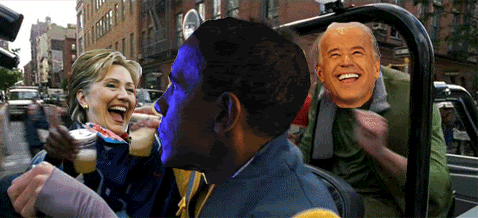 Mike Fahie solos on The Injustice League
Mike Fahie solos on The Injustice League
Last week the
Bottomless Cup Jazz Orchestra has it's debut at the
Brooklyn Lyceum. It was an incredible experience to be in front of so many great musicians hearing my music played and an even greater experience to hear people say they liked what they heard. I was pleasantly surprised by how many people made it out and wanted to send a public heartfelt thank you to all of you who came with open ears and hearty applause, making the night a success.
I don't think fans realize how important their role is to musicians like myself. When one spends hours upon days upon weeks upon months writing and rewriting and revising and cleaning and printing music, sacrificing coffees with friends, blog writing, marathon training, good weather and precious hours of sleep in addition to hour upon hour of phone calls, emails, text messages, and
Facebook messages to musicians and potential audience members, it can be a crushing defeat to have few attendees present to witness the fruition of all your hard work. In the beginning, when few people know you, and you are still ironing out logistical bumps and personal writing style, an emerging artist like myself can really only rely on friends and family, many who would not normally find themselves at a "jazz" or "new music" show, filling the empty chairs. I feel extremely grateful that more than the expected 3 people showed up last week. It is with their support that music like mine can continue its growth and evolution into something that can one day be enjoyed by more than just close, obliging and supportive friends.
Being a musician, much less a composer and bandleader in the jazz genre, which is a genre that continues to gray as musicians who started off as "
jazzers" find themselves cross-
pollinating with other genres, is a bit of a masochistic endeavor. No one really listens to jazz. Those that do are usually other jazz musicians. The definition of jazz continues to become looser and looser and in the process people are taking sides a la
Heroes, and there go a few less audience members. It costs WAY more money to put on a show than what is
received from your half of the door (half if you're lucky), making fan attendance crucial if in no way other than from a financial standpoint.
When looked at plainly (and a bit bitterly), a composer like myself uses all of her time to write music for an extremely
minuscule pool of listeners, losing money in the process. As
Darcy James Argue said in
Glowing Realm's Ten Questions column, "Believe me, if it was remotely possible for me to do something other with my life than lead an 18-piece
big band, I’d do that. In a heartbeat."
But what keeps us from getting dark upon our career choice are nights like last Wednesday, when expectations are exceeded and one finds herself supported by
enthusiastic applause and smiles from the audience. You can't help but feel an incredible sense of gratitude, not only to your musicians who do the rehearsals and gigs for barely enough to cover that night's dinner, but to your friends, your fans, your supporters.
Speaking of Darcy and the need for support, Darcy is embarking upon a venture that most of us only dream of: a studio recording. If putting on a big band show is expensive, recording a big band album is obscene. These days its not hard for most musicians with small groups to record, many in their own homes. The home technology is amazing, unless you have upwards of 15 people in your band. So for now, until space for a large recording studio becomes a common
amenity for NY apartments, big bands are stuck doing either live recordings or relying once again on those family, friends, and fans for the financial support to make a studio recording.
And all of this is contingent upon finding a record label that doesn't completely rob the artist of the money to be made off the recording. Darcy, the intrepid
entrepreneur that he is, has discovered a record label that not only allows the artist to keep an
initial 80% of the profits, but does not dictate the music to be recorded, as so many other labels are fond of.
Darcy explains it better:...what I like best about New Amsterdam is that the label brings together a group of artists that feels like a community without feeling like it's bound to a specific musical ideology. Beyond a basic agreement on a set of core principles that would go without saying in most circles -- "popular music is art," "embracing diverse influences is cool," "grooves feel good," "smart music can be fun" -- there's really not a definitive sound or style that you could pin down as being "the New Amsterdam thing." And while it's not exactly a "jazz" label, I feel that the kind of music I've been pursuing with Secret Society is, in a lot of ways, closer in spirit to what many NewAm artists are doing than it is to contemporary mainstream jazz.
Now, given some of my anti-record label comments on this blog in the past, some may be surprised that I am going with a label at all for our debut recording. Labels, we are told, are over. The contracts are irredeemably exploitative -- you have to give up ownership of your creative work, and these days they don't really do all that much to help you anyway. In fact, there's every chance they will seriously fuck you without your knowledge or consent. The thing to do is to put it out youself.
Well, sure. That's one way to do it -- and more power to those who do. But there is also value in being part of a movement. There's value in being associated with like-minded artists. There's value in trying to be constructive, in trying to build a mutually supportive scene. This is what New Amsterdam has set out to accomplish. And it's not just a bunch of hand-wavy crap either. Founders William Britelle, Judd Greenstein, and Sarah Kirkland Snider are all formidable composers themselves, and they are genuinely commited to fostering a mutually beneficial relationship between artist and label. Don't believe me? New Amsterdam's Arist Agreement is a publically available Google Document. You can read it right here.
Some highlights:
• You retain full ownership of all material on your album, including the master recording itself.
• Gross proceeds from album sales are split 80/20 [in the artist's favor] until artists costs are recouped, at which point the split moves permanently to 50/50.
• Proceeds, including CD sales, from live performances that are booked/presented by New Amsterdam are split 80/20 in favor of the artist. New Amsterdam gets nothing from shows that are booked/presented by the artists.
• This agreement is valid for 4 years from the release date of each record (on a record-by-record, not artist-by-artist basis). At the end of the term, both parties may agree to extend this term. If the term is not extended, New Amsterdam will no longer collect any proceeds related to the master recording.
Compare that to a typical major label contract. No, go ahead. I'll wait.
While it is incredibly exciting to find such a caring label, the reality is they are not giving away freebies. Money still has to be raised, and that is no easy task. Darcy explains further:
Last Sunday I posted in praise of New Amsterdam Records, who will be releasing our debut recording. I also posted a link to the NewAm Artist Agreement, which details, in plain English, the financial arrangement I have with them. As you can see, it is extremely artist-positive — I retain full copyright of the recording and proceeds from album sales are split 80/20 in my favor until the recording costs are recouped.
The flip side of this, however, is that the artist does not get an advance to pay for recording costs. However, since in a traditional record contract, the "advance" is often a one-way ticket to perpetual indentured servitude, the NewAm terms are ultimately much more favorable. But it does mean that the responsibility of raising the necessary capital to make the recording in the first place is 100% on the artist. And recording a big band in the studio is a crushingly expensive proposition — which is why I have avoided it thus far.
[...]
The reality is, we cannot make this album without your help.
Basically, in addition to a few monetary compensations from recent awards won, Darcy is relying solely on the generous hearts and wallets of his fans, of his supporters, to pay for the initial fee. He is taking a leap of faith that enough people out there will extend their support past filling an empty chair to filling the missing dollars needed to make this next step towards furthering the path of contemporary music.
The sad truth is, we are not the popular music. There are no talent scouts or "big breaks" to be had in our area of the musical neighborhood. When I told my dad I had a gig with my band at a venue in Brooklyn, his first question was, "Any chance some talent scouts will be there? Maybe this could be your big break!" If only the remote possibility of this were to exist! No dad, mine is not the music of talent scouts and record producers. My music and others' like it exist entirely without the padding of record advances and media hype and only on the immediate support of it's listeners. And this why extremely talented musicians like Darcy are forced to rely financially on his fan base in order to progress.
I have long since been a fan of Darcy's Secret Society. I beseech you, if you haven't checked out his music, do it. Visit his blog, MySpace, Facebook, or New Amsterdam listing, whatever floats your Internet boat, and consider donating. If you have ever read his blog or downloaded his free live recordings, consider donating. If you are interested in being a part of small things that lead to greatness, consider donating.
It's a hard time financially and you have every right to want more information before willingly handing over the few dollars that could upgrade tonight's dinner from pasta noodles in butter to pasta in olive oil with spinach salad and wine. Read his plea, listen to his music. If you don't like it, go buy that bottle of red. But if you do like what you hear, consider this: You have a a chance to be a part of something reactionary. Something that is literally taking today's artistic music to the next ground. Something that is defiant to the economic crisis put upon us by those who probably have one Wynton Marsalis CD and consider themselves culturally well rounded. Music may be getting cut from the schools to save money, but we do not have to let music die entirely!
I thank everyone who supported me in my recent pursuits; I hope you will consider supporting Darcy as well.
 Came across this blog dedicated entirely to Christmas music on record. I now feel very inspired to dig up my 1983 Care Bear Christmas album and play it on my record player.
Came across this blog dedicated entirely to Christmas music on record. I now feel very inspired to dig up my 1983 Care Bear Christmas album and play it on my record player.

 from Races In Places encouraging you to run off those holiday cookies!
from Races In Places encouraging you to run off those holiday cookies!
































